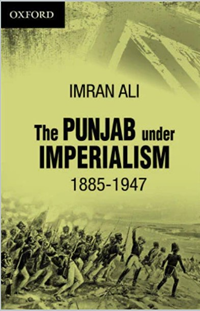The Punjab Under Imperialism 1885-1947
Material type: TextLanguage: English Publication details: Karachi : Oxford University Press c2003Description: xi, 264 pISBN:
TextLanguage: English Publication details: Karachi : Oxford University Press c2003Description: xi, 264 pISBN: - 9780195799248
- 954.035052 ALI
| Item type | Current library | Shelving location | Call number | Status | Date due | Barcode |
|---|---|---|---|---|---|---|
| Rent (Rs. 60) | Book Bank | Book Bank | 954.035052 ALI | Available | B52700 | |
| Rent (Rs. 60) | Book Bank | Book Bank | 954.035052 ALI | Available | B52692 | |
| Rent (Rs. 60) | Book Bank | Book Bank | 954.035052 ALI | Available | B52698 | |
| Rent (Rs. 60) | Book Bank | Book Bank | 954.035052 ALI | Available | B52696 | |
| Rent (Rs. 60) | Book Bank | Book Bank | 954.035052 ALI | Available | B52694 | |
| Rent (Rs. 60) | Book Bank | Book Bank | 954.035052 ALI | Available | B52693 | |
| Rent (Rs. 60) | Book Bank | Book Bank | 954.035052 ALI | Available | B52697 | |
| Rent (Rs. 60) | Book Bank | Book Bank | 954.035052 ALI | Available | B52691 | |
| Rent (Rs. 60) | Book Bank | Book Bank | 954.035052 ALI | Available | B52699 | |
| Rent (Rs. 60) | Book Bank | Book Bank | 954.035052 ALI | Available | B52695 |
Summary
The Punjab—an area now divided between Pakistan and India—experienced significant economic growth under British rule from the second half of the nineteenth century. This expansion was founded on the construction of an extensive network of canals in the western parts of the province. The ensuing agricultural settlement transformed the previously barren area into one of the most important regions of commercial agriculture in South Asia. Nevertheless, Imran Ali argues that colonial strategy distorted the development of what came to be called the “bread basket” of the Indian subcontinent. This comprehensive survey of British rule in the Punjab demonstrates that colonial policy making led to many of the socio-economic and political problems currently plaguing Pakistan and Indian Punjab.
Subordinating developmental goals to its political and military imperatives, the colonial state cooperated with the dominant social classes, the members of which became the major beneficiaries of agricultural colonization. Even while the rulers tried to use the vast resources of the Punjab to advance imperial purposes, they were themselves being used by their collaborators to advance implacable private interests. Such processes effectively retarded both nationalism and social change and resulted in the continued backwardness of the region even after the departure of the British.
